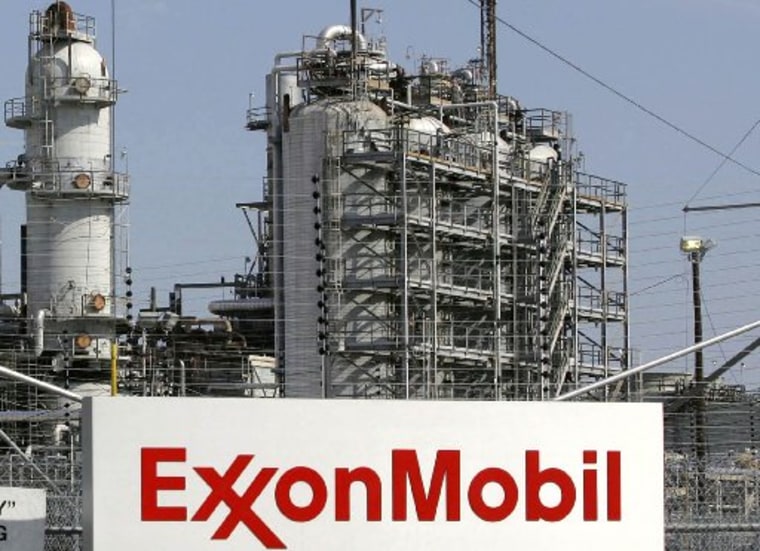ExxonMobil shareholders on Wednesday voted for the 14th year in a row to reject a resolution that would add nondiscrimination protections for LGBT employees to the company’s equal employment opportunity (EEO) policy.
The 81%-19% vote comes in what was otherwise “a record year for corporate equality,” according to the Human Rights Campaign's annual Corporate Equality Index. Company after company updated its anti-discrimination policies to include LGBT provisions. ExxonMobil, though, received the lowest rating--negative 25--of any Fortune 500 company in HRC’s report.
The oil giant’s overwhelming defeat of the resolution infuriated LGBT advocates, while also highlighting the stalled national Employment Non-Discrimination Act (ENDA). If Congress put ENDA into place, the legislation would create a national ban on workplace discrimination against LGBT Americans in the same way that federal law already prohibits employment discrimination based on religion, race, gender, national origin, or disability.
“It’s clear that ExxonMobil is not going to change its policy unless it’s forced to,” said Heather Cronk, co-director of GetEQUAL, to msnbc. “We need to get ENDA passed.”
“Exxon might make money from fossil fuels, but it’s lagging behind most other Fortune 500 companies with [its] fossilized workplace policies,” said Tico Almeida, president of Freedom to Work, in a statement. “Exxon remains on the wrong side of history for its business, for its workers, and for the American people.”
Freedom to Work last week filed a discrimination complaint against ExxonMobil with the Illinois Department of Human Rights, accusing the company of anti-gay bias. Following the shareholders' meeting, Almeida told msnbc that he would “settle the lawsuit today if Exxon adopted the same policies that competitors like Chevron and Texaco have already adopted.”
ExxonMobil spokesman Charlie Engelmann offered no comment to msnbc on the lawsuit, other than to say that it was currently under review.
The resolution to implement policies that explicitly ban discrimination based on sexual orientation and gender identity was put forth to ExxonMobil on behalf on New York State Comptroller Thomas P. DiNapoli, who said in a statement that it was time for the company to “take off its blinders and join the vast majority of Fortune 500 companies." According to Human Rights Campaign, 88% of Fortune 500 companies have adopted anti-discrimination policies based on sexual orientation, and 57% include protections for gender identity.
Exxon’s Standards of Business Conduct in the U.S. protects employees from discrimination on the basis of race, sex, religion, national origin, citizenship status, age, genetic information, physical or mental disability, veteran, or other legally protected status. But absent from the company standards is any mention of sexual orientation or gender identity.
“The Company’s Equal Employment Opportunity (EEO) and Harassment in the Workplace policies, which are included in the Standards of Business Conduct (Standards), constitute just one component of our employment nondiscrimination policies,” said ExxonMobil’s board of directors in its annual proxy statement. “Other communication initiatives, training programs, and investigating and stewardship processes explicitly state that any form of discrimination or harassment in the workplace based on sexual orientation will not be tolerated, and more broadly, that no form of discrimination or harassment in the workplace will be tolerated. It is these elements, as a totality, that constitute ExxonMobil’s policies.”
LGBT advocates, however, are not satisfied. “It’s not sufficient just to say, ‘We would never discriminate against LGBT people,’” said Cronk to msnbc. “If you’re serious about it, then put a policy in place...If someone were to be discriminated against, that person would have nowhere to go.”
Exxon’s spokesman declined to explain further. “For the EEO policy questions, we let the board’s response stand as it is,” he said.
He also declined to comment on why the company stopped offering health care benefits for its employees’ same-sex partners after Exxon acquired Mobil in 1999. Prior to the merger, Mobil had a policy that prohibited discrimination based on sexual orientation, and extended partner benefits to same-sex couples, noted the New York comptroller in a press release.
“No one really understands why [ExxonMobil] has been so obstinate on this issue in particular,” said Cronk. “But they’re not just behind; they’re really far behind.”
Cronk and Almeida are both calling on President Obama to sign an executive order barring federal contracts to companies that do not explicitly protect LGBT employees.
“Overnight, ExxonMobil would have to change its policy,” said Cronk, speaking of the impact an executive order would have. “But more than that, it’s wrong for the federal government to be spending taxpayer money on companies that discriminate against LGBT employees.”
